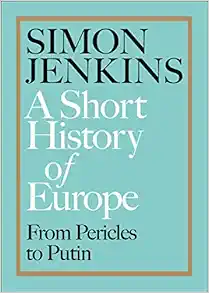
A Short History of Europe
Description
Simon Jenkins is author of bestselling books Britain's 100 Best Railway Stations, A Short History of England, England's Thousand Best Churches and England's Thousand Best Houses. He is former editor of the Evening Standard and The Times, and columnist for The Guardian and Evening Standard.Simon Jenkins is the author of the bestselling books Britain's 100 Best Railway Stations, A Short History of England, England's Thousand Best Churches and England's Thousand Best Houses. He is the former editor of the Evening Standard and The Times, and a columnist for The Guardian and Evening Standard. He has served as deputy chairman of English Heritage and chairman of the National Trust, was a founder member of SAVE Britain's Heritage and chaired the revision of the Pevsner guides from 1994 to 2011. He founded the Railway Heritage Trust and has served on the Boards of British Rail and London Transport. He lives in London and Aberdyfi.
Features & Highlights
- The first short, single-volume history of the continent, from the author of the bestselling A Short History of England Europe is an astonishingly successful place. In this dazzling new history, bestselling author Simon Jenkins grippingly tells the story of its evolution from warring peoples to peace, wealth and freedom - a story that twists and turns from Greece and Rome, through the Dark Ages, the Reformation and the French Revolution, to the Second World War and up to the present day. Jenkins takes in leaders from Julius Caesar and Joan of Arc, to Wellington and Angela Merkel, as well as cultural figures from Aristotle to Shakespeare and Picasso. He brings together the transformative forces and dominant eras into one chronological tale - all with his usual insight, colour and authority. Despite the importance of Europe's politics, economy and culture, there has not been - until now - a concise book to tell this story. Covering the key events, themes and individuals, Jenkins' portrait of the continent could not be more timely - or masterful. 'Full of stand-out facts ... absolutely fascinating' - Richard Bacon, BBC Radio 2, on 'A Short History of England' 'Masterly, perhaps a masterpiece' - Independent, Books of the Year on England's Thousand Best Churches 'Jenkins is, like all good guides, more than simply informative: he can be courteous and rude, nostalgic and funny, elegant, convincing and relaxed' - Adam Nicolson on 'England's Thousand Best Houses', Evening Standard 'Full of the good judgements one might hope for from such a sensible and readable commentator, and they alone are worth perusing for pleasure and food for thought' - Michael Wood on 'A Short History of England', New Statesman 'Any passably cultured inhabitant of the British Isles should ask for, say, three or four copies of this book' - Max Hastings on 'England's Thousand Best Houses', Sunday Telegraph





